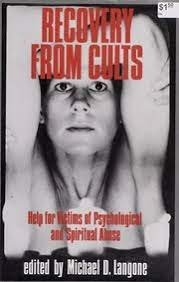Jul 27, 2025
Caring in the Shadows: Emotional and Caregiving Challenges Faced by Families of Individuals in Coercive Controlling Groups and Relationships
Feb 23, 2022
ICSA Annual Conference: Assessment of perceptions and experiences of family members or individuals concerned about a loved one who is or was in a controlling or abusive group or relationship
Assessment of perceptions and experiences of family members or individuals concerned about a loved one who is or was in a controlling or abusive group or relationship.(Panel Part 1/2)
Carmen Almendros, Michael Langone
ICSA Annual Conference
Friday, June 24th
1:00 PM - 1:50 PM (Panel Part 1)
2:00 PM - 2:50 PM (Panel Part 2)
"Psychological abuse within cultic groups is a worldwide social problem that has negative impacts on the health of victims-survivors, families and communities. A growing body of research has evidenced the manipulative and abusive practices endured by many followers of these groups and their deleterious effects on members and former members’ wellbeing. Despite progress here, little is known about how the involvement and/or ongoing membership of a loved person to such groups affects their family members or friends. In fact, the lack of study of the experiences and problems faced by families and relatives of victims-survivors seems to be a common research gap within other areas in which coercive controlling relationships occur (e.g., intimate partner violence). To address these gaps we conducted a study to examine the concerns, responses and experiences of family members, relatives and friends of members and former members of controlling and/or abusive groups or relationships. The initial sample of the study consisted of 230 participants who were/had been concerned over a current or past involvement of a loved one in one of such groups/relationships. Some of the participants were themselves survivors of the same groups/relationships (around 30% had been born and/or raised in such). Results showed that responses seemed very comparable with those obtained when studying family members of people with other problems (generally a diagnosis of a mental health problem) in terms of family distress and emotional experiences of caring. Understanding the difficulties and problems faced by family members and their coping responses may not only give visibility to the suffering of these close relatives of victims/survivors of abusive relationships, as well as evidence the scarcity of useful helping resources, but may contribute to inform prevention and intervention efforts on this crucial societal problem."
Carmen Almendros
Profesora Titular
Universidad Autónoma de Madrid
Carmen Almendros, PhD, is Associate Professor in the Biological and Health Psychology Department at the Universidad Autónoma de Madrid, Spain. She is on ICSA’s Board of Directors, and is International Journal of Cultic Studies, Co-Editor. She published a book and several articles on psychological abuse in group contexts, cult involvement, leaving cults, and psychological consequences of abusive group membership. Her research interests also include the study of parental discipline and psychological violence in partner relationships. She is principal researcher of a project entitled: Coercive control as a differentiating element of violent dynamics in youth relationships: an intermethod and longitudinal study, financed by the Spanish Ministerio de Ciencia, Innovación y Universidades. She was the 2005 recipient of ICSA’s Margaret Singer Award, given in honor of her research into the development of measures relevant to cultic studies.
Michael Langone
Executive Director
International Cultic Studies Association
Michael D. Langone, PhD, received a doctorate in Counseling Psychology from the University of California, Santa Barbara in 1979. Since 1981 he has been Executive Director of International Cultic Studies Association (ICSA), a tax-exempt research and educational organization concerned about psychological manipulation and cultic groups. Dr. Langone has been consulted by several hundred former cult members and/or their families. He was the founder editor of Cultic Studies Journal (CSJ), the editor of CSJ’s successor, Cultic Studies Review, and editor of Recovery from Cults: Help for Victims of Psychological and Spiritual Abuse (an alternate of the Behavioral Science Book Service). He is co-author of Cults: What Parents Should Know and Satanism and Occult-Related Violence: What You
Should Know. Currently, Dr. Langone is ICSA Today’s Editor-in-Chief. He has been the chief designer and coordinator of ICSA’s conferences, which in recent years have taken place in Bordeaux, Stockholm, Trieste, Barcelona, New York, Montreal, Rome, Philadelphia, Geneva, Denver, Brussels, Atlanta, Edmonton, and Madrid. In 1995, he was honored as the Albert V. Danielsen Visiting Scholar at Boston University. He has authored numerous articles in professional journals and books, including Psychiatric Annals, Business and Society Review, Sette e Religioni (an Italian periodical), Grupos Totalitarios y Sectarismo: Ponencias del II Congreso Internacional (the proceedings of an international congress on cults in Barcelona, Spain), Innovations in Clinical Practice: A Sourcebook, Handbook of Psychiatric Consultation with Children and Youth, Psychiatric News, and all of ICSA’s periodicals. Dr. Langone has spoken widely to dozens of lay and professional groups, including the Society for the Scientific Study of Religion American Association for the Advancement of Science, Pacific Division, American Group Psychotherapy Association, American Psychological Association, the Carrier Foundation, various university audiences, and numerous radio and television stations, including the MacNeil/Lehrer News Hour and ABC 20/20. He is also co-editor of ICSA's Cult Recovery: A Clinician's Guide to Working With Former Members and Families, published in 2017.Register: https://whova.com/web/icsaa_202207/





